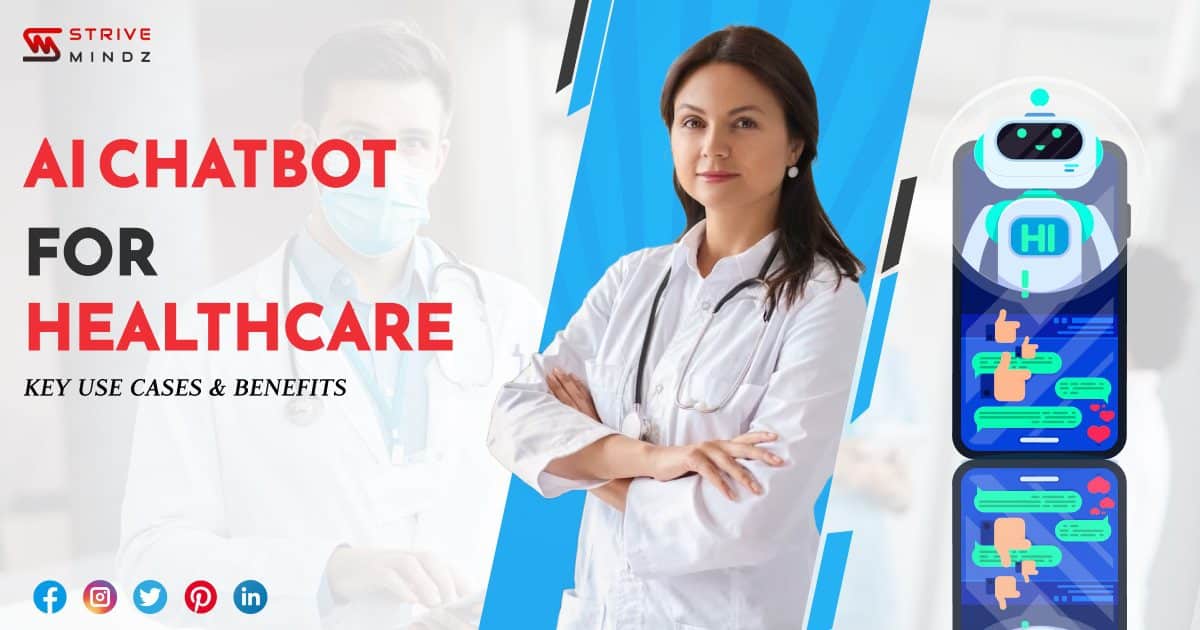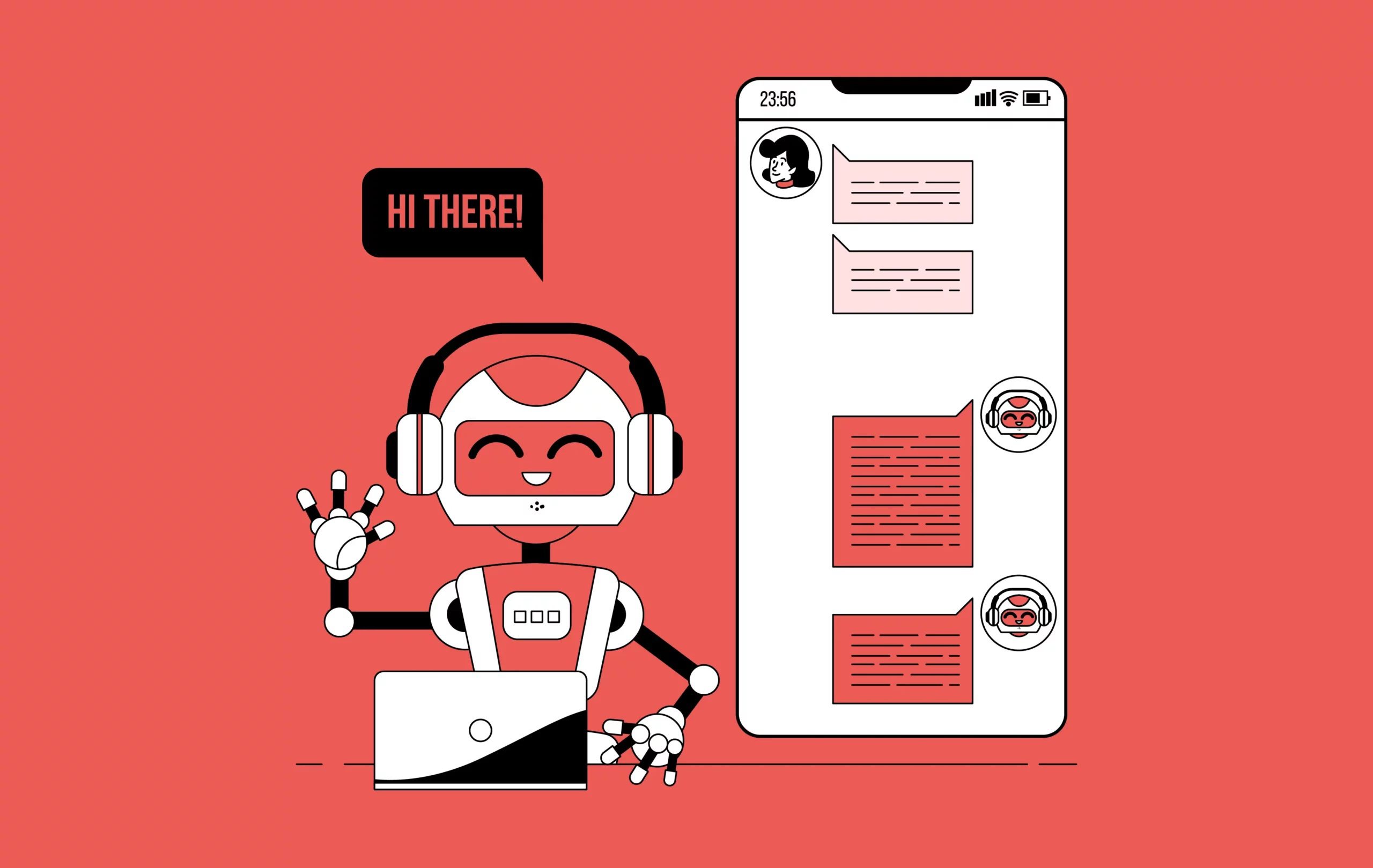AI Chatbot for Healthcare in 2024: Key Use Cases & Benefits

AI chatbots for healthcare are transforming the industry, as they help professionals serve patients 24 hours a day, 7 days a week. By providing easy access to healthcare, the conversational artificial intelligence chatbot reduces caseloads.
Artificial Intelligence (AI) chatbots have emerged as a powerful tool in various industries, including healthcare. With advancements in natural language processing and machine learning,
AI chatbots are transforming the way healthcare providers interact with patients, streamlining operations, and enhancing overall healthcare experiences.
In this article, we will explore the key use cases and benefits of AI chatbots in healthcare, envisioning their potential impact in the year 2023. From improving patient engagement and experience to optimizing healthcare operations, we will delve into the ways AI chatbots are revolutionizing healthcare delivery.
Additionally, we will address the challenges and considerations associated with deploying AI chatbots while envisioning the prospects of this technology in the healthcare industry.
What is an AI-driven Healthcare Chatbot?
Healthcare chatbots represent the forefront of virtual customer service and play a pivotal role in planning and managing healthcare businesses. These chatbots, automated tools crafted to emulate intelligent conversations with human users, are powered by artificial intelligence.
AI-driven healthcare chatbots excel in handling straightforward inquiries, offering users a convenient means to access information. Often, these self-service tools facilitate a more personalized interaction with healthcare services compared to traditional methods such as navigating websites or engaging with external call centers.
According to Salesforce, a significant 86% of customers prefer obtaining answers from a chatbot over filling out a website form. This trend is equally applicable in the healthcare industry.
The Emerging Role of Chatbots in Healthcare
Move over stethoscopes, there’s a new tool in town! AI chatbots are revolutionizing the healthcare industry by taking on various roles. From answering basic health-related questions to providing personalized patient support, these digital sidekicks are becoming an essential part of the healthcare ecosystem.
How Big is The Healthcare Chatbots Market?
The growing demand for virtual health assistance stands as a crucial factor driving the expansion of the worldwide healthcare chatbot market. This technology proves invaluable in aiding users across various sectors, with a notable focus on its applications within the healthcare industry for both clinicians and patients.
According to an analysis by Data Bridge Market Research, the global healthcare chatbots market, valued at USD 248.93 million in 2022, is projected to reach USD 1179.81 million by 2030. The market is anticipated to experience a Compound Annual Growth Rate (CAGR) of 20.80% during the forecast period from 2023 to 2030. The dominant component in this market is “Software,” offering comprehensive solutions with a broad spectrum of functionalities.
Market reports from Data Bridge Market Research not only provide insights into key aspects such as market value, growth rate, segmentation, geographical coverage, and major players but also include in-depth expert analyses, patient epidemiology, pipeline analysis, pricing analysis, and regulatory frameworks.
Benefits of AI Chatbot in Healthcare

Enhancing Patient Engagement and Experience
-
Personalized patient interactions
Gone are the days of generic responses. AI chatbots bring a whole new level of personalization to patient interactions. They can remember personalized information, provide relevant healthcare recommendations, and even offer empathetic responses, making patients feel heard and understood.
-
24/7 availability and instant responses
Forget about waiting on hold or playing phone tag with healthcare providers. AI chatbots are available round the clock, ready to offer instant responses to patients’ queries and concerns. Whether it’s the middle of the night or during a Netflix binge, patients can access reliable healthcare advice at their convenience.
-
Patient education and empowerment
Knowledge is power, and AI chatbots are here to empower patients with health education. These chatbots can provide accurate and up-to-date information on various medical conditions, treatment options, and preventive care. Patients can now be proactive in managing their health and making informed decisions.
Streamlining Appointment Scheduling and Management
-
Automating appointment scheduling
No more playing phone tag with busy receptionists. AI chatbots can automate the appointment scheduling process, allowing patients to book their appointments hassle-free. With just a few clicks, patients can secure their spot without the frustration of long wait times or unanswered calls.
-
Efficient appointment reminders and rescheduling
We all know how easy it is to forget about that doctor’s appointment amidst our hectic lives. AI chatbots act as reliable virtual assistants, sending timely appointment reminders to patients. In case of conflicts, rescheduling can also be done seamlessly, ensuring patients never miss out on their much-needed medical attention.
-
Integration with electronic health records (EHR)
AI chatbots take organizations to a whole new level by integrating with electronic health records. This allows them to access patients’ medical history, allergies, and medications, improving the quality of care. No more repeating your medical history during every visit – the chatbot already knows!
Improving Diagnosis and Treatment Recommendations
-
Symptom assessment and triage
Worried about that annoying headache? AI chatbots can assist with symptom assessment and provide triage recommendations, helping patients determine the urgency of their health concerns. They can even suggest self-care measures for minor issues, saving unnecessary trips to the doctor’s office.
-
AI-driven diagnostic assistance
AI chatbots are no replacement for doctors (thank goodness!), but they can lend a helpful hand in the diagnostic process. By analyzing symptoms and medical history, these chatbots can provide preliminary diagnostic insights, aiding doctors in making faster and more accurate diagnoses.
-
Personalized treatment recommendations
Treatment plans are not a one-size-fits-all scenario. AI chatbots can assist in providing personalized treatment recommendations based on patient’s specific conditions, medical history, and even lifestyle factors. These tailored suggestions can help patients navigate their healthcare journey with confidence and clarity.
Enhancing Remote Patient Monitoring and Telemedicine
-
Remote vital sign monitoring
AI chatbots have the potential to revolutionize remote patient monitoring by collecting and analyzing vital signs in real time. From tracking heart rate and blood pressure to monitoring glucose levels, these chatbots can provide valuable insights to healthcare professionals and alert them in case of any abnormalities. With this technology, patients can receive personalized and timely care without the need for frequent hospital visits.
-
Virtual consultations and telemedicine support
Imagine having a doctor’s appointment without leaving your home. AI chatbots make this possible by enabling virtual consultations and telemedicine support. Patients can interact with a chatbot that can assess their symptoms, provide medical advice, and even connect them with healthcare professionals if necessary. This convenient and efficient approach saves time, reduces unnecessary physical visits, and improves access to healthcare, especially for those in remote areas.
-
Medication adherence and reminders
One of the challenges in healthcare is ensuring patients adhere to their prescribed medications. AI chatbots can play a crucial role in reminding patients to take their medications on time. These chatbots can send automated reminders, provide medication information, and even track adherence patterns. By addressing this issue, AI chatbots help improve patient outcomes and reduce the risk of medication-related complications.
Optimizing Healthcare Operations and Workflow
-
Automating administrative tasks
AI chatbots can lighten the administrative burden on healthcare professionals by automating tasks such as appointment scheduling, medical record updates, and billing. By streamlining these processes, healthcare providers can focus more on patient care, ultimately improving the overall efficiency and productivity of the healthcare system.
-
Managing patient queues and wait times
Nobody enjoys waiting for hours in a crowded waiting room. AI chatbots can assist in managing patient queues and reducing wait times. By interacting with patients and providing estimated wait times, these chatbots can help patients plan their visits more effectively. Additionally, they can prioritize patients based on urgency and assist in triaging, ensuring timely care for those who need it most.
-
Integration with existing healthcare systems
AI chatbots can integrate with existing healthcare systems, such as electronic health records (EHRs) and telemedicine platforms. This seamless integration allows for improved data sharing, comprehensive patient profiles, and better coordination among healthcare professionals. Ultimately, this integration leads to more informed decision-making and improved patient outcomes.
Addressing Data Privacy and Security Concerns
-
Complying with data protection regulations
Data privacy and security are paramount in healthcare. AI chatbots must comply with stringent data protection regulations, such as HIPAA, to ensure the confidentiality and integrity of patient information. By implementing robust security measures and encryption protocols, these chatbots can provide peace of mind to both patients and healthcare providers.
-
Ensuring secure data transmission and storage
To maintain data privacy, AI chatbots prioritize secure data transmission and storage. By utilizing encryption and secure communication protocols, sensitive patient information remains protected during transmission. Additionally, these chatbots store data in secure databases, implementing access control measures and regular backups to prevent unauthorized access or data loss.
-
User authentication and access control
AI chatbots employ authentication and access control mechanisms to prevent unauthorized access to patient data. By implementing multi-factor authentication and role-based access control, these chatbots ensure that only authorized individuals can access and interact with sensitive healthcare information. This safeguards patient privacy and reduces the risk of data breaches.
Future Potential and Challenges of AI Chatbots in Healthcare
Potential applications and advancements
The potential applications of AI chatbots in healthcare are vast and exciting. As technology evolves, these chatbots can become even more intelligent, assisting in diagnosing diseases, predicting health conditions, and providing personalized treatment recommendations. The future holds great promise for AI chatbots to revolutionize the healthcare industry.
Ethical considerations and limitations
While AI chatbots offer numerous benefits, ethical considerations and limitations must be acknowledged. Issues such as privacy, bias, and the potential for misdiagnosis need to be addressed. It is crucial to strike a balance between relying on AI chatbots for healthcare decisions while still valuing the expertise and human touch of healthcare professionals.
Overcoming implementation challenges
Implementing AI chatbots in healthcare comes with its own set of challenges. Healthcare organizations need to invest in robust infrastructure, ensure adequate training for both professionals and patients and navigate potential resistance to change. Overcoming these challenges requires a collaborative effort between healthcare providers, technology developers, and policymakers to successfully integrate AI chatbots into the healthcare ecosystem.
How Are Chatbots Used in Healthcare? A Few Key Use Cases
Chatbots in healthcare serve various crucial purposes, offering innovative solutions to improve patient care, streamline administrative processes, and enhance overall efficiency. Here are key use cases for chatbots in healthcare:
- Appointment Scheduling: Chatbots assist users in scheduling appointments with healthcare providers. They can check availability, book appointments, and send reminders, reducing the burden on administrative staff.
- Symptom Checker and Triage: Healthcare chatbots can help users assess their symptoms, providing initial triage and recommending appropriate levels of care. This functionality aids in directing patients to the right resources or suggesting urgent medical attention when necessary.
- Medication Reminders and Management: Chatbots play a role in medication management by sending reminders for dosage schedules, providing information about medications, and offering support for medication adherence.
- Health Education and Information Retrieval: Users can access reliable health information through chatbots, promoting health literacy. Chatbots offer information on various medical conditions, treatments, and preventive measures.
- Remote Monitoring and Chronic Disease Management: Chatbots assist in remote monitoring of patients with chronic conditions. They can collect and analyze data such as vital signs, allowing healthcare providers to intervene proactively when needed.
- Post-discharge follow-up: After a hospital stay, chatbots facilitate post-discharge follow-ups. They can check on patients, inquire about recovery, and provide information on post-treatment care, contributing to better post-operative outcomes.
- Mental Health Support: Chatbots offer mental health support by providing resources, coping strategies, and acting as a non-judgmental outlet for users to express their feelings. They can also identify potential mental health issues and guide users to professional help.
- Billing and Insurance Queries: Chatbots assist patients with billing and insurance-related queries, helping them understand costs, coverage, and payment options. This improves transparency and reduces confusion.
- Language Translation Services: Healthcare chatbots equipped with language translation capabilities bridge communication gaps between healthcare providers and patients who speak different languages, ensuring effective communication and understanding.
- Emergency Response and First Aid Guidance: In emergencies, chatbots can provide immediate guidance on first aid measures and connect users to emergency services. This timely assistance can be critical in emergencies.
The versatility of healthcare chatbots contributes to improving patient experiences, optimizing workflows, and extending the reach of healthcare services, ultimately enhancing the overall quality of care.
How to Build an AI Chatbot for Healthcare
When deciding to develop an AI chatbot for healthcare medical diagnosis and symptom checking, you have three options:
- Utilizing a rule-based chatbot (i.e., a chatbot with a pre-defined conversation flow).
- Employing an AI-powered chatbot (i.e., a chatbot driven by AI that does not rely on natural language processing to comprehend queries and provide accurate responses).
- Integrating a combination of both rule-based and AI-powered conversation flows.
While an AI-powered chatbot for healthcare systems is often perceived as more advanced, it may not necessarily be the superior choice in every scenario.
To determine the most suitable chatbot for your needs, it’s crucial to clearly define your goals. If you believe that a predetermined flow will adequately assist your patients, then opting for a rule-based chatbot is a viable choice.
On the other hand, if you aim to offer patients a more human-like, interactive experience, an AI-powered chatbot is the preferred option.
Read also: How to Build an AI Chatbot for Your Website in 2024? (Step-by-Step)
Many companies opt for a hybrid approach, combining rule-based and AI-powered flows for their medical diagnosis chatbots. For example, when a patient visits your website and engages with the chatbot for the first time, they can express their concerns in their own words. The chatbot can then use AI to interpret the input and subsequently guide them through a rule-based flow tailored to their symptoms.
Conclusion
The integration of AI chatbots for healthcare holds immense potential to revolutionize the industry and improve patient outcomes. With their ability to enhance patient engagement, streamline operations, and provide personalized care,
AI chatbots are poised to become indispensable tools in healthcare settings. However, it is crucial to address data privacy and security concerns while navigating the ethical considerations and implementation challenges associated with deploying this technology.
As we look towards the future, the continued advancements in AI and chatbot technology will undoubtedly pave the way for even more innovative and impactful use cases in the realm of healthcare.
Find a qualified healthcare software development company like Strivemindz when you need a chatbot solution for healthcare.
FAQs
How secure is the data handled by AI chatbots in healthcare?
Data security is a critical concern in healthcare, and AI chatbot developers prioritize the protection of patient information. Robust security measures, such as encryption, access controls, and compliance with data protection regulations, are implemented to ensure the confidentiality and integrity of patient data. It is essential to choose AI chatbot solutions that adhere to strict security standards and prioritize patient privacy.
Can AI chatbots accurately diagnose medical conditions?
AI chatbots can assist in the diagnostic process by analyzing symptoms and providing recommendations based on predefined algorithms and machine learning models. However, it is important to note that AI chatbots should not be considered as a replacement for professional medical diagnosis. They can offer insights and suggestions, but the final diagnosis should always be made by qualified healthcare providers.
How can AI chatbots improve healthcare operations and workflow?
AI chatbots can optimize healthcare operations by automating administrative tasks, managing patient queues, and integrating with existing healthcare systems like electronic health records (EHR). By reducing manual workloads and streamlining processes, AI chatbots help healthcare providers focus on delivering quality care, improving efficiency, and enhancing the overall workflow within healthcare facilities.


